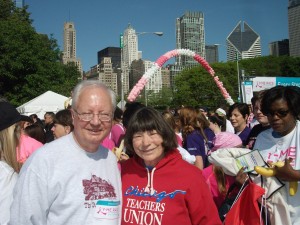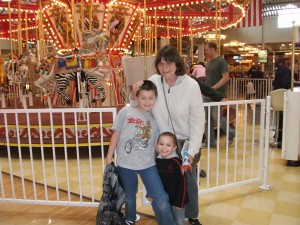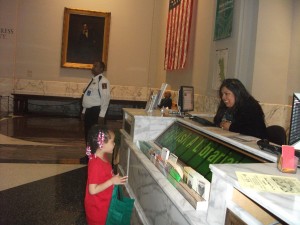 More often than not, New Year’s resolutions involve aspirations for some type of self-improvement: eating a better diet; exercising more; getting better grades in school; or achieving something in one’s profession. I am no stranger to such resolutions. I am still living with the decision two years ago to start working with a personal trainer. Having slogged through a year following Hurricane Sandy with 23 business trips, three others to Iowa in connection with my adjunct professorship at the University of Iowa, and some personal trips, I finally decided that, if I were to sustain the stamina to continue at such a pace, something needed to change. I signed up at X Sports Fitness, but then was delayed in implementing my plan when I injured myself with a pinched nerve on New Year’s Eve by carelessly tossing a heavy laptop on my shoulder at Barnes & Noble. I started 2014 with a few weeks of therapy to ease the pinched nerve before finally launching my plan. But I have never looked back and recently became my trainer’s first client to do a two-minute plank, just before my 66th birthday.
More often than not, New Year’s resolutions involve aspirations for some type of self-improvement: eating a better diet; exercising more; getting better grades in school; or achieving something in one’s profession. I am no stranger to such resolutions. I am still living with the decision two years ago to start working with a personal trainer. Having slogged through a year following Hurricane Sandy with 23 business trips, three others to Iowa in connection with my adjunct professorship at the University of Iowa, and some personal trips, I finally decided that, if I were to sustain the stamina to continue at such a pace, something needed to change. I signed up at X Sports Fitness, but then was delayed in implementing my plan when I injured myself with a pinched nerve on New Year’s Eve by carelessly tossing a heavy laptop on my shoulder at Barnes & Noble. I started 2014 with a few weeks of therapy to ease the pinched nerve before finally launching my plan. But I have never looked back and recently became my trainer’s first client to do a two-minute plank, just before my 66th birthday.
So I understand and applaud the best intentions if they become real. But I am going to suggest something much riskier and more profound if you are ready to follow me into the deep water. Oh, yes, learning to swim is also a legitimate resolution.
I suggest that you at least consider resolving to get your hands dirty this year. Metaphorically, that is. On behalf of creating a better society, if not changing the world in some small way.
By getting your hands dirty, I do not necessarily mean protesting in the streets, but what I mean may include some vocal advocacy. It does not mean simply charitable work, such as Toys for Tots, as helpful as that may be. What I mean is getting involved in some way that entails some risk of learning to see the world in a new way because you must be open to new perspectives in order to be effective at what you choose to do. It may involve some reputational risk if others do not immediately see the benefit of what you are trying to accomplish. Some of the greatest leaders in the world had to endure significant opprobrium in order to produce fundamental changes in society that have benefited us all. But the change you initiate most likely will not be so grand and may even be invisible to most people. Let me share our own example.
A quarter-century ago, my wife and I began to explore options for adoption through foster care. One can talk all day long about what may need to change in improving the lives of our most vulnerable children, but until you actually get down in the trenches, accepting one or much children into your home, learning of the life circumstances that brought them there, and really committing to better outcomes, you can never learn what obstacles exist to producing real change. It is deep one-on-one commitment, a leap of faith into generally unknown and sometimes unknowable backgrounds that power deeply engrained reactions by children to the world around them. This blog does not begin to offer sufficient space to explore this topic—I actually started a memoir about 12 years ago that I have never finished—but it does allow me to use this as an object lesson in, first, making some kind of a difference, and second, in how easily you can underestimate how difficult that is.
Children who have suffered some type of abuse or neglect at the hands of natural parents are among the most prolonged sufferers of post-traumatic stress syndrome precisely because they have usually suffered at a time when they were too young to make sense of their surroundings or to understand that what was happening to them was not normal or acceptable. Their supple young minds are simply programmed to react to stimuli that, when they cease to exist in real life, still haunt them in ways they cannot articulate and can only begin to understand with the help of sustained therapy. Sometimes, an overloaded child welfare system compounds the problem by placing them in new abusive circumstances that only add to a child’s confusion, depression, and withdrawal.
And then, as a foster parent with intent to adopt, you step in with the objective of trying to help fix all that. If you are like us, you step in with a modest amount of training before certification, but you quickly learn that what you know is a tiny fragment of what you will come to know. Our two daughters are now grown and have their own children, and we and they are all still learning. Yet many people see the system as one in which children are emancipated at age 18, and these new adults who never had a proper childhood are now expected to act and proceed as if they have all the tools to succeed in life, and some foster parents operate on the same assumptions. Our society can be incredibly naïve at times.
Or incredibly judgmental. Unfortunately, one daughter’s penchant for running away, both literally and figuratively, from her problems led to a few encounters with police. It is seldom possible for police to understand even a small portion of the background that leads to such encounters, and most understand that, but that does not prevent some from harshly assuming that the problems were created by your bad parenting, especially when they do not know they are dealing with adoptive parents. There may even be some truth to their judgment at some times, but it is also true, and I know this as deeply as I know anything, that you can make errors of parental judgment simply because you do not know what emotional triggers lie deep within someone’s early childhood experience. It may take years, which is why we try to remain close and supportive but also instructive. Making a positive difference can take a long, long time.
I will not elaborate further because it is not my intent to highlight foster care and adoption as the only ways to get your hands dirty. You can undertake many other initiatives, and many of them may involve direct attempts to influence public policy. What I am suggesting is that, if you want truly to make a lasting difference, choose something that challenges your preconceptions, that liberates you from simplistic assumptions, and makes you rethink, over and over again, exactly what difference you are making, why you want to make it, and the best way to achieve it. The most important risk you can take is to be open to challenging your own assumptions about how that change is going to occur and what it may ultimately mean. It means getting close enough to people to get hurt once in a while.
The world is not a simple place, and there is, as some have said, a world of hurt out there. Resolve to change some of that, and in the process, to put as much of your ego aside as possible. Resolve to get your hands dirty. God will appreciate what you do even if no one else does.
Jim Schwab


